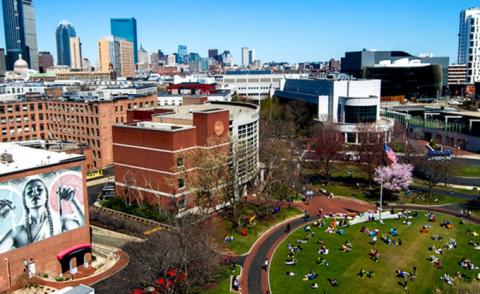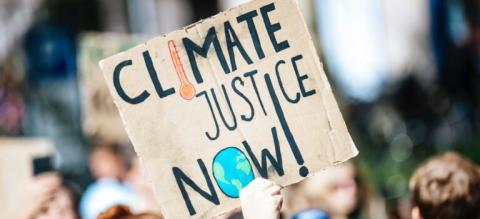The science is clear. To reduce human suffering from the climate crisis, humanity must implement a coordinated global plan to phase out fossil fuels. Exploration of new fossil fuels must end, extraction of existing fossil fuel resources must be rapidly scaled back, and new transformative public investments are needed. Despite the scientific clarity of this basic, practical need for climate justice, powerful corporate interests continue to exert their influence to resist change. Unfortunately these corporate interests have also been wielding their power and influence in higher education by strategically investing to perpetuate fossil fuel reliance and to minimize the transformative climate justice potential of educational and research programs.
At COP27, the international climate policy conference that recently ended in Sharm el Sheikh, Egypt, climate justice was a major theme underlying the most contentious parts of the negotiations. While the agreement to establish a loss and damage fund acknowledges the injustices of the disproportionate devastation of climate disruptions, the failure to agree on a plan toward fossil fuel phaseout demonstrates the lack of commitment to transformative change.

Image credit: Ahmad Gharabli | Afp | Getty Images | CNBC
It is within this context that I propose we reimagine the role of higher education in advancing climate justice and promoting societal transformation toward a more just, healthy, and stable future. I invite all of the GCSE community to join this collective endeavor to reclaim the role of higher education in transformative social change for climate justice.
Given the devastation of worsening climate disruptions around the world, it is time for higher education institutions to step up and redefine our role as change agents in society for the collective public good. We need a movement to shift higher education away from private sector finance and corporate influence, so that colleges and universities can leverage their unique position in society to embrace a transformative lens and promote transformative social innovations. At this critical time, those of us who work and learn in higher education have new opportunities to be creative and innovative in how we advance transformative climate justice.
Climate justice is an approach to climate action that goes beyond narrow efforts to reduce greenhouse gas emissions. Climate justice centers the fact that climate change is inextricably connected to social justice, racial justice, and economic justice because marginalized communities that have long faced under-investment are more vulnerable to climate disruptions of all kinds, including extreme heat, flooding, storms, and food insecurity. A commitment to climate justice is a paradigm shift from more conventional, technocratic ways of defining climate action, because climate justice focuses on investing in people and communities through initiatives that acknowledge and try to repair past environmental injustices while preventing continued and future climate injustices. A commitment to climate justice is a commitment to societal transformation because climate justice acknowledges that the climate crisis is a symptom of flawed economic and political systems that concentrate wealth and power through exploitative and extractive processes. A climate justice lens recognizes the reality that despite decades of dire warnings from climate scientists, political leaders around the world have been unable to resist the influence of corporate and financial interests and have inadvertently prioritized corporate interests over the public good.

Northeastern University campus, Boston, Massachusetts, USA. Image credit: Northeastern University
Although many institutions of higher education have also been co-opted by corporate fossil fuel interests and influence, the higher education sector is unlike any other sector in that it is uniquely positioned to contribute to a societal shift that reprioritizes the public good. Higher education institutions have both the intellectual resources and societal reach to lead on transformative thinking and collective social change. A commitment to climate justice provides a helpful framework for colleges and universities to align their many initiatives and programs toward a collective goal of transforming society for a more healthy, equitable, and sustainable future.
During the 2022-2023 academic year, one of my sabbatical projects focuses on advancing a paradigm shift in how we collectively conceptualize transformation in higher education for the transformations that are needed in society. In addition to the transformative potential of how and what we teach and conduct research, I am exploring how higher education plays a role in shaping public discourse, providing alternative visions of the future, and demonstrating innovations in our own communities. Higher education institutions have large, untapped potential and many opportunities to leverage our influence and resources to advance climate justice.
To date, much of the climate action in higher education has focused on greenhouse gas emissions inventories which is a narrow, technocratic way of thinking about the university’s climate impact. Advancing climate justice requires moving beyond reducing emissions toward new initiatives that involve direct, active engagement with systemic and structural changes in society – linking climate and energy with health, jobs and social justice. Colleges and universities have a valuable role to play by demonstrating how these issues are all interconnected and also by supporting social innovations that disrupt the structures that have emboldened corporate influence and enabled decades of obstructed climate policy.
Higher education initiatives consistent with a commitment to transformative climate justice include many diverse possibilities, including education policy and financial innovations to expand public funding of higher education and minimize corporate influence. Many other initiatives are context-specific to different campuses and the communities in which they are embedded including: social innovations to end fossil fuel reliance in energy, transportation, food systems and local infrastructure; workforce innovations to end sub-contracting low-paid workers so that employees all receive a living wage with the same good benefits; and community-health innovations to integrate health care access and nourishing food access on campus and in the surrounding communities.

Image credit: Yale Program on Climate Change Communication
A commitment to climate justice could also include investing resources in pilot community-based renewable infrastructure, bringing direct benefits to struggling households and creating good green jobs accessible to underinvested-in local communities.
Colleges and universities could also implement climate justice by setting near-term 100% renewable targets, incorporating climate justice and sustainability into teaching and learning, prioritizing involvement and leadership of local community members in university governance, and resisting the influences of fossil fuel interests.
Decades of strategic investment, interference, and influence by fossil fuel interests in higher education finance and governance is not easy to change. But by aligning university initiatives toward climate justice, the impact of these legacy influences can be first minimized and then reversed. University endowments can be divested from fossil fuel-based corporations, fossil fuel research funding and philanthropy can be refused, and transparency in university governance can be prioritized to demonstrate institutional commitment to the public good rather than private corporate interests. Restricting the influence of fossil fuel interests on the boards of trustees, and investing in clean energy projects that benefit the community are other specific actions that align with a commitment to climate justice.
A commitment to climate justice in higher education institutions provides a framework to leverage the untapped potential of colleges and universities to apply knowledge for transformative change for the public good. While it is clear that there is no simple formula for how to make changes to ensure that higher education is catalyzing and accelerating social change for climate justice rather than slowing it down, I invite you all to join this collective effort of reimagining and redefining the role of higher education in moving society toward a more just, sustainable and equitable future.
Investing in climate justice is an opportunity for higher education, not a cost. Prioritizing climate justice and challenging fossil fuel power establishes universities as climate leaders and institutions committed to a better future. Young people need educational institutions that prepare them for the uncertain world ahead by empowering them with agency and creativity and supporting them to innovate for transformative change for a better future for all.
Jennie C. Stephens, Dean’s Professor of Sustainability Science and Policy at Northeastern University’s School of Public Policy and Urban Affairs, is the author of “Diversifying Power: Why We Need Antiracist, Feminist Leadership on Climate and Energy” (Island Press, 2020). www.jenniecstephens.com @jenniecstephens
Opinions expressed in this essay are those of the authors. They do not purport to reflect the opinions or views of the GCSE or its members.